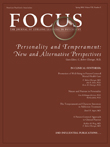Novelty Seeking: Interaction Between Parental Alcohol Use and Dopamine D4 Receptor Gene Exon III Polymorphism Over 17 Years
Abstract
Recent meta-analyses have questioned the association between the dopamine receptor D4 (DRD4) gene polymorphism and the temperament trait of novelty seeking, and proposed an interaction between the polymorphism and other factors. We wanted to test whether parental alcohol use during childhood moderated the effect of an offspring dopamine receptor gene (DRD4) polymorphism on the temperament trait of novelty seeking in adulthood. A population-based sample of children and adolescents (n = 2149) and their parents was examined in 1980 and 1983 on parental alcohol use and rearing practices. In 1997, study participants completed the Temperament and Character Inventory for the novelty-seeking temperament trait, and a subsample (n = 150) was genotyped for the DRD4 exon III polymorphism. For the participants with the father, but not the mother, reporting more frequent alcohol consumption or drunkenness in examinations 17 and/or 14 years before the novelty-seeking assessment, an association between the short (two- or five-repeat) alleles of the DRD4 gene and extremely high novelty-seeking scores was observed. When the father reported less frequent alcohol consumption or drunkenness, the genotype was not associated with novelty seeking. The association remained after controlling for sex, age, and maternal childrearing. These results provide preliminary information on gene-environment interaction on the temperament trait of novelty seeking and may partly explain the heterogeneity of findings concerning the association between DRD4 polymorphisms and novelty seeking.
(Reprinted with permission from Psychiatric Genetics 2005; 15:133–139)



